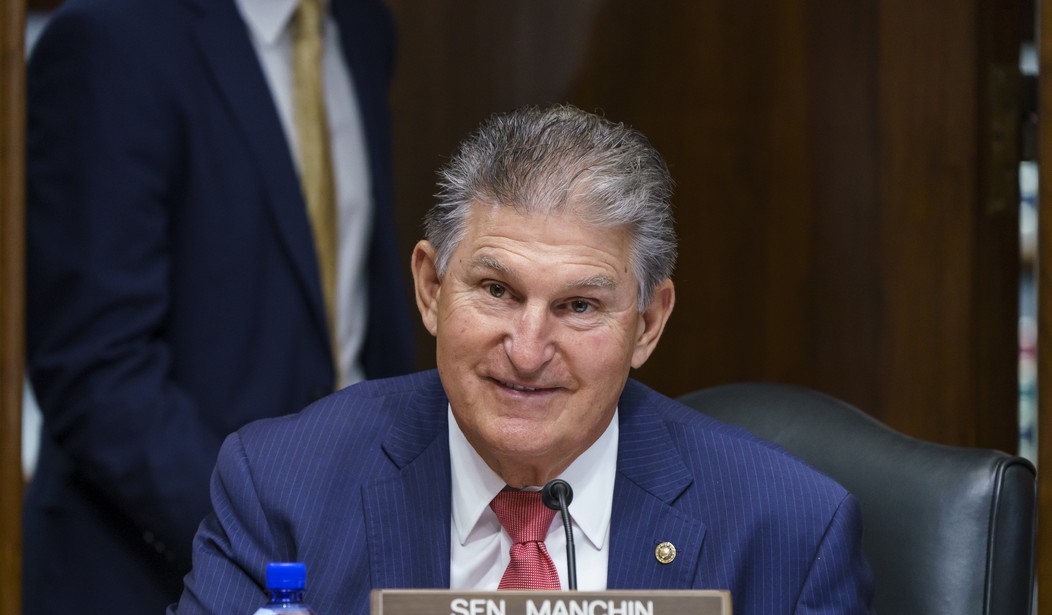So says Axios, anyway, although it doesn’t make much sense. It’s tough to fault their sourcing for this claim, however, since it comes directly from Joe Manchin himself. His talks with Chuck Schumer on a “slimmed down” Build Back Better plan are serious, he told Axios reporter Hans Nichols.
The timing on this sudden public expression of interest in a new spending package is mighty curious. The West Virginia Democrat has steadfastly blocked any reconciliation spending for the past year on two principles. First, Manchin insisted on a cap that amounted to about a third of what Schumer and Joe Biden wanted to spend. And second, Manchin wanted to work on real deficit reduction rather than create more spending in this inflationary environment.
So what’s changed? Maybe nothing but the politics:
Behind the scenes: As Manchin and Schumer try to repair a strained relationship, their staffs have been making progress on the contours of a climate and deficit reduction package, according to people familiar with the matter.
Manchin called those preliminary talks “respectful” and “encouraging, to a certain extent.”
“There could be nothing,” Manchin told us in an interview. “There could be truly nothing. That’s all I can tell you.”
“Chuck has a very, very difficult job,” Manchin added. “The trust that I have, it’s his ability to be able to move 48 or 49 other people.”
If we take this at face value, it does make a certain kind of sense. Democrats are about to get shellacked in the midterms, in part — but only in part — because Schumer has wasted a lot of time the past seventeen months on bills that had no chance of passing. The election is now about five months away, and really even closer than that when you count early voting. There just isn’t much time to put Ws on the scoreboard, especially meaningful wins. No one cares about passing bills that have no real opposition … or better put, Schumer needs wins that Democrats can claim for their own.
So if Manchin’s worried about Chuck having a very, very difficult job, maybe Manchin wants to toss him a bone this election cycle to make it easier. It may be a $1.8 trillion bone that adds fuel to inflation’s fire, but what’s a trillion bucks among friends?
But perhaps we shouldn’t take this at face value. Nichols thinks that Manchin might have some strategy in mind that merely uses Schumer’s desperation as leverage:
Manchin this week told a bipartisan group of senators with whom he’s been negotiating over a climate and energy security bill that he’s prepared to back tax increases in a Democrat-only bill if the bipartisan group can’t agree to any additional revenue.
Manchin told Axios he understands why some Republican senators might conclude that a Democrat-only reconciliation package is his “ace in the hole,” giving him more leverage in the bipartisan talks.
That makes it sound like Manchin’s playing both sides against the middle, almost literally. He’s leveraging his talks with the bipartisan group to shave even more spending off of the BBB reconciliation spending, which Nichols says is now well below the previous $1.75 trillion in spending that Manchin claimed was his cap. At the same time, Manchin’s leveraging his talks with Schumer to get Republicans to agree to some targeted tax increases to raise revenue and close some of the deficit gap. It may be a case of whichever side crosses the Manchin Finish Line first gets the deal.
Here’s the rub, however, at least for Schumer and BBB. Would it do Democrats any good at all to pass it now? It might have done them some minor and short-term good to have passed it last year before inflation truly caught fire. At that point, voters might have prioritized its climate change and equity issues to some extent. All of that, however, has been vaporized by Biden’s hyperinflation, supply-chain crises, and especially the record gas prices that has hammered lower-income voters hardest.
In essence, pushing even a slimmed-down BBB to fruition would perpetuate a problem that Democrats from Biden on down since last summer. They’re talking past voters, not listening to them. Rather than deal with the real issues hammering Americans, they’re still obsessing over the progressive agenda. In fact, the massive spending that will go into even a slimmed-down BBB will aggravate those highest-priority issues rather than alleviate them. Schumer and Biden keep leaving the impression that they not only don’t have any connection to the lived experience of American households, they couldn’t care less about it.
One has to wonder whether Manchin really wants to join his pal Chuck in that pose. That would indeed be an “incredible transition” for Manchin to make. It seems more likely at this late date that Manchin’s stringing Schumer along to get enough Republicans on board to pass a corporate minimum tax rate of 15% in order to boost revenues, at least in the short run, and close the deficit. It might even work, and it has at least a somewhat better chance than a BBB revival of Democrats’ fortunes.








